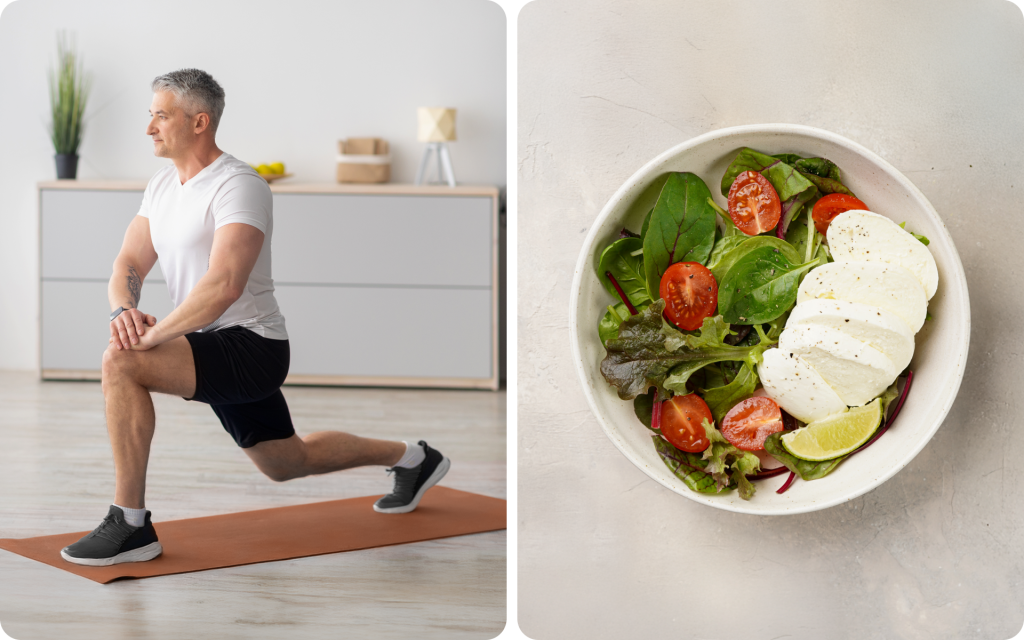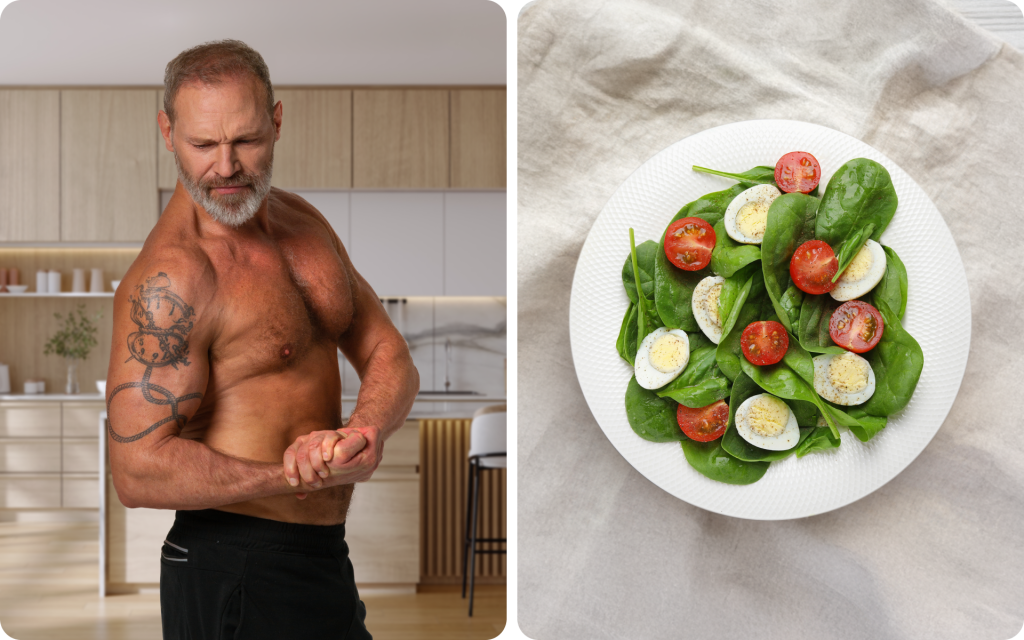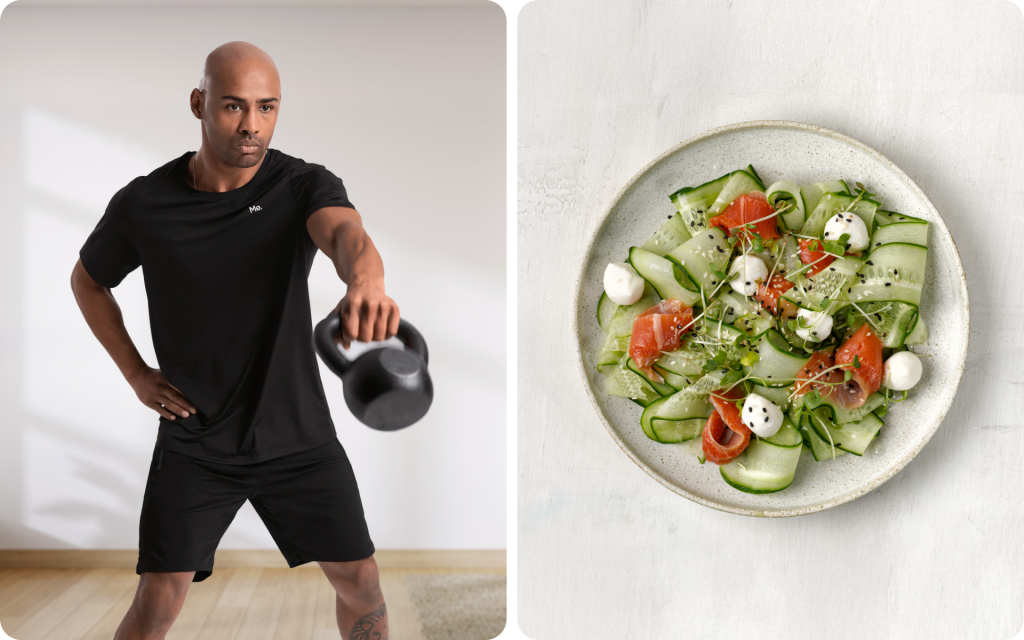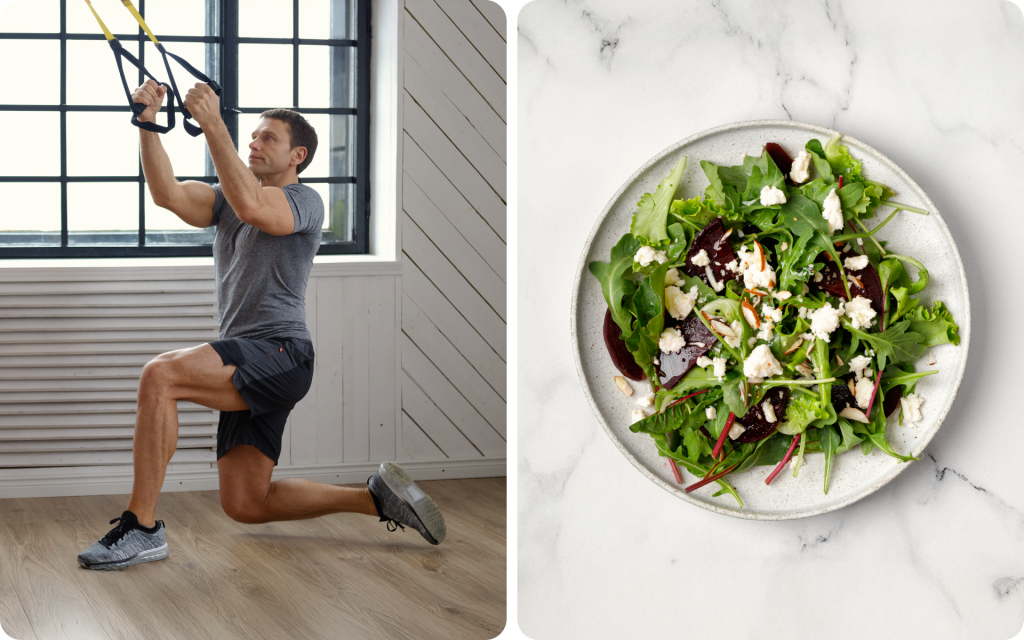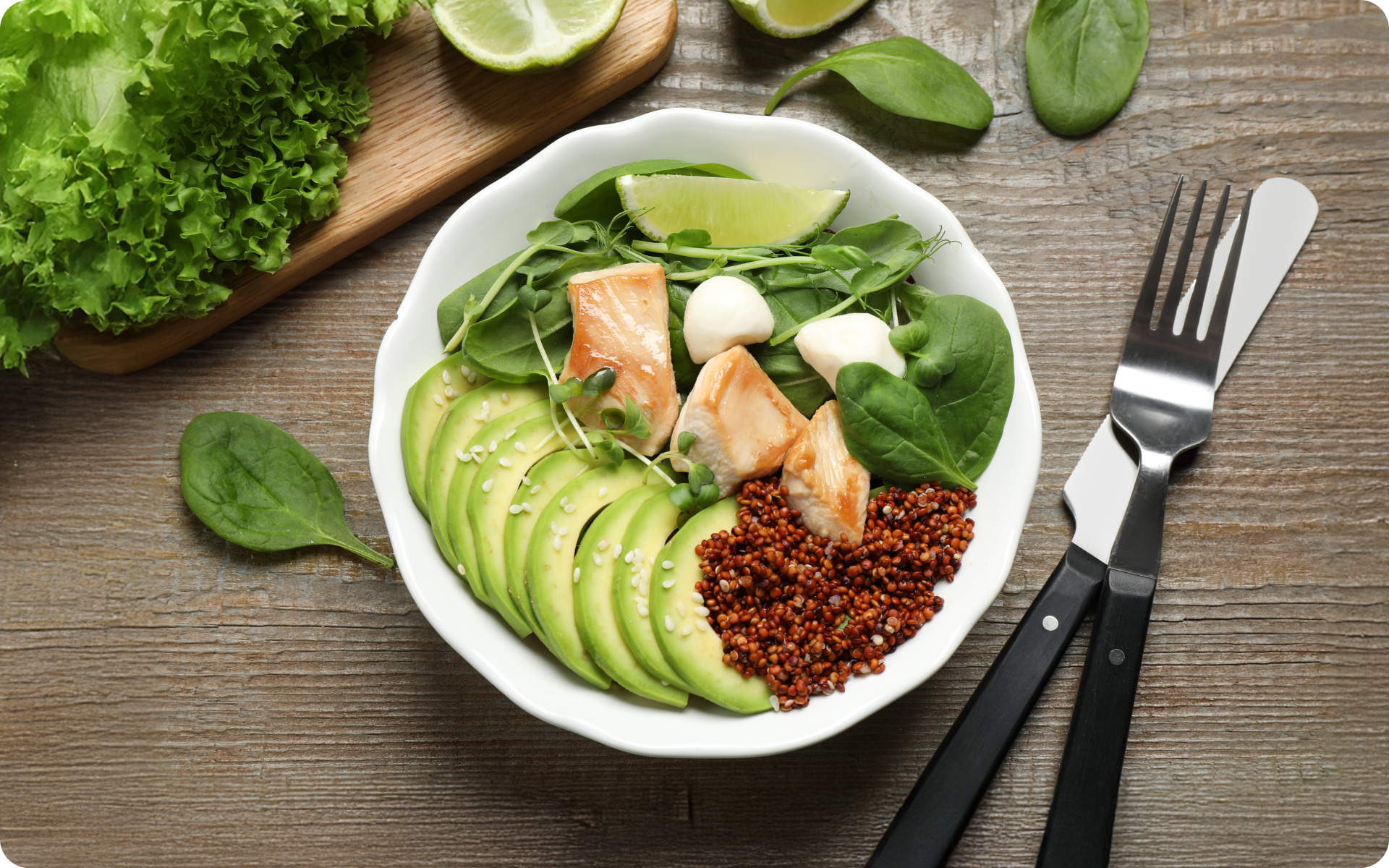According to a data survey published by the CDC in late 2024, researchers found that the prevalence of obesity in adults in the United States was 40.3% with adults aged between 40 – 59 years being the most affected of all age groups (1).
In a recently published study looking at the global prevalence of obesity in older adults, researchers found that there is an increasing trend in the prevalence of obesity in older adults worldwide (2).
As a man in your 50s, you may not be considered an older adult just yet, but not taking care of your current weight could lead to obesity and related issues, i.e, increased risk of cardiovascular problems, some cancers, functional limitations, disability, and a poorer quality of life (3) down the line.
Diet plays a significant role in weight control.
If you are currently overweight and want to take control of your body and the scale, this sample meal plan for a 50-year-old man can help steer you in the right direction.
What Is A Tailored Meal Plan For A 50-Year-Old Man To Lose Weight?
A tailored meal plan for a 50-year-old man to lose weight is a customized and personalized eating plan designed to match his:
- Age
- Health status
- Nutritional needs
- Lifestyle and activity level
- Weight loss and overall health goals.
A tailored healthy meal plan for 50-year-old man will always be best with the guidance of a healthcare provider or a registered dietitian, following a thorough consultation that helps understand the individual’s needs, current health status, future fitness goals, and other relevant factors.
What Is The Best Diet To Lose Weight In Your 50s?
Many diets offer weight loss benefits. From the high-protein diet, the Mediterranean diet, keto, etc., all these eating plans have in one way or another helped many reach their goals (4, 5, 6).
However, despite the success, researchers stress that there is no one ‘most effective’ diet for weight loss. They suggest that any of these diets can help jumpstart the weight loss journey, but for long-term results, it is best to adopt a diet that creates a negative energy balance and focuses on balance and good food quality to promote health.
So, where does that leave us?
Researchers looking into the most popular weight loss diets all seem to agree that the best and easiest eating plan for weight loss is a nutritionally balanced, hypocaloric (aka calorie-deficient) diet (4).
A calorie deficit (aka energy-deficient) is the most crucial factor in weight loss (5), and ensuring that the diet is nutritionally balanced ensures that your body gets all the nutrients it needs for proper function, even as you are eating less.
Read more: Nutrition For The Elderly: Tips To Promote Healthy Eating
How Do I Jumpstart Weight Loss As A Man At 50?
Here are some things to do to ensure that your 7-day diet plan for weight loss works and will help you lose weight after 50:
Reduce Your Calorie Intake
Research suggests reducing your average daily calorie intake by 500-750 calories (4, 5). When you provide your body with less food energy than it burns in a day, it begins to look for other energy sources, such as stored fat, to burn to keep you going. Over time, this will lead to both fat and weight loss.
Increase Your Protein Intake
According to scientific research, protein plays a key role in weight loss as it contributes to this process in 3 main ways (7):
-
Increased Satiety
As mentioned above, you will need to reduce your overall calorie intake to kickstart the weight loss process. This caloric decrease usually means that you’ll feel hungrier than usual, which could tempt you into eating more than the recommended deficit.
Protein helps increase perceived satiety, making you feel fuller, which in turn reduces your chances of exceeding your daily calorie goal.
-
Increased Diet-Induced Thermogenesis
One of the ways that your body burns calories is through digestion.
When the body has to digest and process protein, it ends up using more energy (i.e., burning more calories) than it does to digest fats or carbs.
Essentially, eating a diet higher in protein will help your body burn a few more calories, which contributes to fat and weight loss.
BetterMe: Health Coaching app helps you achieve your body goals with ease and efficiency by helping to choose proper meal plans and effective workouts. Start using our app and you will see good results in a short time.
-
Maintaining And Increasing Muscle
Protein is the building block of muscle, so consuming higher amounts of it can help prevent muscle loss during weight loss. A higher consumption of this macronutrient, especially when combined with exercise, helps increase or maintain muscle mass.
More lean muscle mass helps increase your resting metabolic rate, which contributes to weight loss.
Increase Your Fiber Intake
According to several studies, increased fiber intake can promote weight loss and reduce the risk of weight gain. Researchers attribute these fiber benefits to increased satiety, which supports reduced calorie intake and influences gut health; also contributing to weight management (8, 9, 10).
Complex carbohydrates are a fantastic source of fiber, and increasing your intake of them can help you lose weight and keep the weight off long-term.
The best sources of complex carbs are whole grains (e.g., oats, brown or wild rice, quinoa, whole wheat bread or pasta, farro, etc), beans and lentils, as well as fruits and vegetables.
Increase Your Intake Of Dark Leafy Greens & Other Non-Starchy Vegetables
Not only are they rich in antioxidants, which are great for your health, but they are also low in calories. You can eat relatively large volumes of dark leafy greens and other non-starchy vegetables without risking your calorie deficit.
Reduce Your Intake of Refined Carbs, Added Sugars & Saturated Fats
An effective weight and belly fat loss diet plan for males should not include too many of any of these foods. While they might taste good, they tend to provide a lot of calories while not being very filling, which is a recipe for overeating.
Scientific research on the effects of refined carbohydrates, added sugars, and saturated fats has suggested that diets too high in all three may not only increase the risk of weight gain and obesity (including abdominal obesity), but also cardiovascular disease, type 2 diabetes, and heart disease (11, 12, 13, 14).
What Is The Best Exercise For A 50-Year-Old Man To Lose Weight?
Aside from improving your diet, you should also consider increasing your daily physical activity. Exercising helps burn calories and increase muscle mass.
The CDC recommends at least 150 minutes of exercise a week, which translates into 30 minutes of exercise 5 days a week (15).
- Do a combination of cardio, flexibility, and strength training workouts.
- Simple cardio examples include walking, swimming, hiking, and water aerobics.
- Strength training exercises should consist of compound exercises like planks, push-ups, pull-ups, squats, deadlifts, lunges, and other similar exercises.
- Perform these strength training exercises with just your bodyweight, resistance bands, or free weights for added resistance.
- If you have any mobility issues that prevent you from doing cardio and weight training, chair yoga for men over 50 is a great low-impact alternative.
What Calorie Target Helps A 50-Year-Old Man Lose Weight?
There is no standard calorie target that could work for all weight loss meal plans for men over 50. A standard calorie target is challenging to gauge because, aside from age and sex, there are multiple other factors like diet adherence, physical activity, genetics, and even medications that affect calorie needs and the rate of weight loss (16).
With that said, according to the Dietary Guidelines for Americans 2020-2025, the estimated calorie needs for men aged 50-59 years are between 2200 and 2800 calories (17), depending on their level of physical activity.
Researchers also recommend reducing your daily calorie intake by 500 to 750 kcal to help kickstart weight loss (5).
A 50-year-old man should track his calorie intake using a reputable calorie-tracking app for about a week to gauge his average calorie intake or estimate his energy needs based on individual factors using an online calculator.
He should then subtract 500-750 kcal from that number, and the new number should be his personal calorie intake target for weight loss.
Read more: Healthy Meals for Seniors to Stay Fit and Independent
Is Intermittent Fasting Effective For 50-Year-Old Men?
Intermittent fasting for men over 50 can be an effective weight loss plan for some in this demographic (18, 19). However, 50-year-old men who have diabetes or other health conditions, as well as those who’ve had a history of eating disorders, should seek professional medical advice before trying intermittent fasting.
What Is A Sample Meal Plan For A 50-Year-Old Man To Lose Weight?
According to the World Health Organization, a healthy diet for adults should include fruit, vegetables, legumes and lentils, nuts, healthy fats, and whole grains.
A healthy diet limits free sugars, unhealthy fats, and excessive salt intake (limited to 5 g a day, around 2000 mg sodium) (20).
Here is a sample meal plan that follows these guidelines:
Day 1
- Breakfast: 2 boiled eggs with a slice of whole grain bread, ½ an avocado, a cup of sautéed spinach, and black coffee
- Snack: Apple and a handful of almonds (or any other available nuts or nut butter)
- Lunch: 200g grilled chicken breast with 1 cup of brown rice, and steamed vegetables of choice
- Snack: Low-fat yogurt with chia seeds and berries
- Dinner: Lemon baked salmon with sweet potato, and a green salad dressed with olive oil and balsamic vinegar
Day 2
- Breakfast: Oatmeal with 1 tbsp nut butter, ½ banana, and cinnamon to taste
- Snack: 1 boiled egg and a small orange
- Lunch: Whole wheat tuna salad wrap and tomato soup
- Snack: 1 cup of carrot and cucumber sticks with 2 tbsp of hummus
- Dinner: Lean beef and vegetable stir-fry with couscous
Note:
- Adjust the meals to suit your recommended calorie deficit intake best
- Feel free to switch up ingredients/meals for other healthy options that you prefer, are available and affordable, or that best suit any diet that you are following, e.g., vegan or vegetarian.
- Limit your alcohol intake. Not only is it bad for your liver, but alcohol offers empty calories and can lead you to eat more.
When it comes to weight loss, progress is made by inches, not miles, so it’s much harder to track and a lot easier to give up. The BetterMe: Health Coaching app is your personal trainer, nutritionist, and support system all in one. Start using our app to stay on track and hold yourself accountable!
Why Is It Hard To Lose Weight In My 50s?
Several factors can make it more challenging to lose weight after 50.
These common challenges include:
- Increased stress levels
- Age-related muscle loss, aka sarcopenia
- A slower metabolic rate
- Increased difficulty in maintaining an active lifestyle as a result of illness or a busier work life.
How To Prevent Muscle Loss While Losing Weight After 50
As previously mentioned, protein and resistance training help with the maintenance and growth of muscle. The recommended daily intake of protein for the average person is 0.8 grams per kilogram of body weight.
However, if you’re exercising and want to maintain and build muscle, research suggests increasing your daily intake to between 1.2 and 1.6 g per kilogram of body weight (21).
Yes, they can. A calorie deficit can help men over 50 lose weight. However, a combination of a reduced-calorie diet and exercise will help speed up the process and assist with muscle maintenance. The basic intake is 0.8 g per kg of body weight per day. However, if the 50-year-old man is exercising and wants to build muscle mass or maintain it while losing weight, then he should increase his intake to 1.2 g to 1.6 g of protein per kg of bodyweight per day. Walking, swimming, cycling, dancing, and water aerobics are all great cardio options for men aged 50 and beyond. These options are low-impact, thus easy on the joints. Yes, they are. Eggs are a fantastic source of high-quality protein and other nutrients that are great for the health of these middle-aged men. If you have a history of heart disease or are at high risk, talk to your doctor about whether or not you need to limit eggs due to their cholesterol or saturated fat content.Frequently Asked Questions
Can men lose weight at 50 without exercising?
How much protein should a 50-year-old man eat daily?
What is the best cardio for a 50-year-old man?
Are eggs good for men over 50?
The Bottom Line
Getting back in shape at 50 is not impossible. Yes, it can be hard (weight loss often is), but it is not an impossible task. This sample meal plan for a 50-year-old man to lose weight is a simple option to show you that healthy eating can be done by all, regardless of age.
We hope that you’ll use the tips shown above to tailor a plan for yourself and your goals. If you have any underlying health issues or are still unsure about some things, please seek professional medical and nutritional advice to help you make the best decision for your health and weight loss goals.
DISCLAIMER:
This article is intended for general informational purposes only and does not serve to address individual circumstances. It is not a substitute for professional advice or help and should not be relied on for making any kind of decision-making. Any action taken as a direct or indirect result of the information in this article is entirely at your own risk and is your sole responsibility.
BetterMe, its content staff, and its medical advisors accept no responsibility for inaccuracies, errors, misstatements, inconsistencies, or omissions and specifically disclaim any liability, loss or risk, personal, professional or otherwise, which may be incurred as a consequence, directly or indirectly, of the use and/or application of any content.
You should always seek the advice of your physician or other qualified health provider with any questions you may have regarding a medical condition or your specific situation. Never disregard professional medical advice or delay seeking it because of BetterMe content. If you suspect or think you may have a medical emergency, call your doctor.
SOURCES:
- Obesity and Severe Obesity Prevalence in Adults: United States, August 2021–August 2023 (2024, cdc.gov)
- Global prevalence of obesity in the older adults: A meta-analysis (2025, sciencedirect.com)
- Obesity in Older Adults: Epidemiology and Implications for Disability and Disease (2013, pmc.ncbi.nlm.nih.gov)
- Weight-Loss and Maintenance Strategies (n.d, ncbi.nlm.nih.gov)
- Optimal Diet Strategies for Weight Loss and Weight Loss Maintenance (2020, pmc.ncbi.nlm.nih.gov)
- Scientific evidence of diets for weight loss: Different macronutrient composition, intermittent fasting, and popular diets (2020, sciencedirect.com)
- Protein, weight management, and satiety (2008, ajcn.nutrition.org)
- Effects of Dietary Fiber and Its Components on Metabolic Health (2010, pmc.ncbi.nlm.nih.gov)
- Increased dietary fiber is associated with weight loss among Full Plate Living program participants (2023, pmc.ncbi.nlm.nih.gov)
- Increasing Total Fiber Intake Reduces Risk of Weight and Fat Gains in Women (2009, sciencedirect.com)
- Physiology, Carbohydrates (2023, ncbi.nlm.nih.gov)
- Get the Facts: Added Sugars (2024, cdc.gov)
- Added sugar intake is associated with weight gain and risk of developing obesity over 30 years: The CARDIA study (2024, sciencedirect.com)
- Trans fat (2024, who.int)
- Adult Activity: An Overview (2023, cdc.gov)
- Factors affecting weight loss variability in obesity (2020, sciencedirect.com)
- Dietary Guidelines for Americans (n.d.,dietaryguidelines.gov)
- The effects of intermittent fasting regimens in middle-age and older adults: Current state of evidence (2021, pubmed.ncbi.nlm.nih.gov)
- Impact of Intermittent Fasting and/or Caloric Restriction on Aging-Related Outcomes in Adults: A Scoping Review of Randomized Controlled Trials (2024, pmc.ncbi.nlm.nih.gov)
- Healthy diet (2020, who.int)
- The role of protein in weight loss and maintenance (2015, sciencedirect.com)


